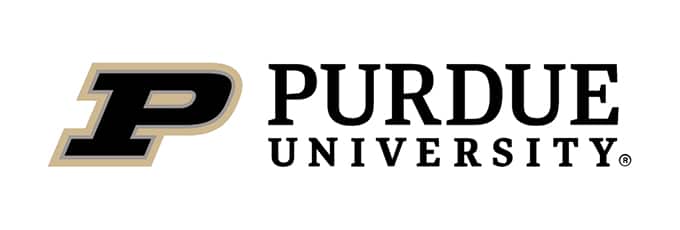Nuclear engineering has undergone a dramatic transformation. Pioneered by figures like J. Robert Oppenheimer and Enrico Fermi, the field emerged from the Manhattan Project’s shadow to embrace more peaceful applications. Today, nuclear engineers are innovating clean energy production, medical advancements and scientific research.
An advanced degree in nuclear engineering from Purdue University’s School of Nuclear Engineering empowers you to be a part of this exciting future. Tetyana Martin, a graduate of Purdue’s online Master of Nuclear Engineering program, has experienced what the future of nuclear engineering holds, and she thinks the field’s potential is bigger than its complicated past.
“There is a fear of nuclear engineering,” said Martin. “People outside of nuclear think you are a crazy scientist when you tell them what you do. But it’s very interesting and not as complex as it looks; so, don’t be afraid of it. Nuclear is the best technology that we have. It’s safe, reliable, clean, and isn’t going anywhere.”

Source: Purdue University
About Purdue’s School of Nuclear Engineering
Established in 1960, the School of Nuclear Engineering has a rich history of excellence. Ranked the sixth-best engineering school in the United States by U.S. News & World Report (2024), Purdue has produced a lot of trailblazing research in the field of nuclear engineering. One example is the Purdue-Duke Energy Joint SMR (Small Modular Reactors) Feasibility Study, a collaborative effort involving dozens of leading experts. Purdue’s campus also houses the Purdue University Reactor One (PUR-1), the only operational nuclear reactor in Indiana. PUR-1 is used for both research and educational purposes, providing students with invaluable hands-on experience.

Purdue University’s online Master of Nuclear Engineering offers the same high-quality instruction as its on-campus counterparts. Source: Purdue University
Flexible learning for working professionals
To accommodate the schedules of working professionals, the School of Nuclear Engineering offers a 100% online Master of Nuclear Engineering (MNE) program. This program is part of Purdue University’s Robert H. Buckman College of Engineering Online Education Program, ranked #3 by U.S. News & World Report (2024), and mirrors the on-campus program’s rigor and quality, featuring the same esteemed faculty and industry-relevant coursework.
“Purdue University offers top-ranked online programs with you at the center,” said Shripad Revankar, professor and graduate program chairman of nuclear engineering at Purdue University. “As an online student at Purdue University, professionals will receive the same quality, affordable education that Purdue is known for, while you learn to push your industry forward, accomplish your goals and change the world.”
Additionally, the program’s flexibility enables professionals to fit their education into your existing schedules. This flexibility was a key factor in Martin’s decision to pursue Purdue’s online MNE program.
“There aren’t many universities that offer nuclear engineering degrees, especially online,” she said. “Purdue is one of the best engineering schools, with a great reputation. I thought, if I’m going to get a degree, I’m going to get the most out of it.”
The online learning platform offers a well-structured and effective environment for delivering course materials. Modern technology facilitates seamless collaboration and interaction with professors and peers. The dedication of the program’s faculty, the structure of the online courses, and the resources available to online students also help professionals like Martin navigate their studies efficiently.
“They provided ample resources, including prompt email communication and office hours via Zoom, ensuring plenty of availability for assistance,” Martin said. “The option to work in groups was particularly beneficial, fostering collaboration and enhancing the learning experience.”
Despite the geographical separation, the online format encourages collaboration and networking among students. For example, Martin established valuable professional connections through group projects and working with classmates located near other nuclear facilities.
“Through these classes, you work with a lot of people and you actually develop friendships,” she said. “The nuclear world is small, so you treasure those relationships. It’s not only knowledge, it’s also relationship.”

The School of Nuclear Engineering offers unique teaching facilities, including a research nuclear reactor and laboratories, to support the MNE program. Source: Purdue University
World-class resources
Purdue boasts a number of world-class resources that support students and faculty in their academic endeavours, including a research nuclear reactor and laboratories. There are also curriculum resources that support professors and online students, such as recordings of live lectures that are uploaded for students to view at their convenience. Additionally, a weekly plan outlines assignments, projects, and exams, allowing online students to learn at their own pace according to each course schedule.
With such resources available, students have all they need to make the most of their master’s degree from Purdue. The result is confident graduates ready to seize a wide range of career opportunities, including positions within government agencies like the Department of Energy (DoE) and Nuclear Regulatory Commission (NRC), utility companies like Duke Energy and Constellation, nuclear technology firms like Westinghouse Electric and consulting and engineering firms like Bechtel Corporation and Fluor Corporation.
“My diploma will help me with my career investment and will open doors for me to go to the director-level positions at the plant,” said Martin.
Such outcomes make for a great return on investment, especially given the MNE program’s affordable fees.
Learn more by following Purdue School of Nuclear Engineering on Facebook, X, Instagram, YouTube and LinkedIn.













